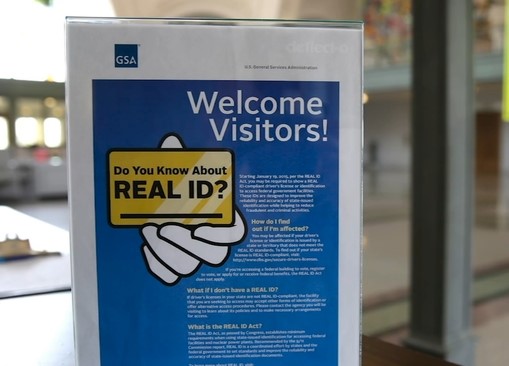REAL ID Required: Here’s what you need to know before May 7
Published 9:15 pm Friday, May 2, 2025
The clock is ticking for Lunenburg County residents, in a sense. If you’re planning to take a flight or access any federal facilities, you’ll soon need a new type of ID. A REAL ID, if you will.
Starting May 7, a REAL ID will be needed to do any of the activities mentioned above. Decades in the making, officials with the Virginia Department of Motor Vehicles stress there is no “last day” to apply for a REAL ID, particularly for those who are not traveling by plane or entering military bases or other secure federal buildings.
The federal law requiring REAL IDs was approved and signed into law in 2005 as a way of tightening security following the Sept. 11, 2001 attacks on the World Trade Center towers and the Pentagon. But the final deadline to require them has been delayed and extended many times as the states geared up to offer them.
Trending
U.S. citizens who have a passport can instead just use it where a REAL ID would be required, according to DMV. For those who believe they will need a REAL ID, state officials offered recommendations for avoiding last minute stress.
“DMV encourages customers to plan ahead,” department officials explained in a statement to the Dispatch. “Flying in September? Schedule an appointment for July. Traveling soon? It’s a smart move to start the process today.”
How does this work?
Upgrading a standard driver’s license to a REAL ID comes with an additional $10 one-time fee, according to DMV.
However, there are a number of required documents Virginia residents will need to provide when they apply. According to DMV publication 141 entitled, “Getting a Virginia Driver’s License or Identification Card, this is what to bring to one of the department’s 76 customer service centers located across the state:
- One proof of identity.
- One proof of legal presence.
- Two proofs of Virginia residency.
- One proof of your social security number.
- Current driver’s license if you are applying to exchange one issued by another U.S. state, territory or jurisdiction for a Virginia driver’s license.
- Proof of name.
DMV officials said getting a REAL ID is simple, noting that applications can be started online. Those applying will then need to book an appointment with the local DMV office to complete the application and provide the required documents.
“We recommend starting your REAL ID application online,” said DMV Commissioner Gerald Lackey. “You can easily check the required documents ahead of time and make an appointment to reserve your spot, making the whole process faster and more convenient.”
In Virginia, REAL ID is optional. DMV officials said in a recent news release, adding that it’s a convenient choice for those who travel often or need to access secure federal facilities.
How does one know if a driver’s license is a REAL ID? Officials said to look for the star in the top right corner of the driver’s license or ID card.
Documentation details for REAL ID
The DMV 141 document provides more detail on the commonly used documents that are needed as part of the application process to receive a REAL ID.
Two documents from the state’s primary proof of Virginia residency is required, or one from the primary list and one from the secondary list.
The primary list includes:
- A deed, mortgage, monthly mortgage statement or residential rental/lease agreement.
- A U.S. Postal Service change of address confirmation form or postmarked U.S. mail with forwarding address label.
- A utility bill, not more than two months old, issued to the applicant. Cell phone bills are not accepted.
If two of these are available, they meet the requirement. However, those with one of the above can use that plus one of the items from DMV’s secondary list, which includes:
- Postmarked mail displaying the applicant’s name and current address.
- Official document or correspondence from a federal, state or local government agency displaying the applicant’s name and current address. DMV–issued documents without postmarked envelopes are not accepted.
- Billing statement or other official document from a recognizable business displaying the applicant’s name and current address.
When it comes to proof of a Social Security number, those who have their card can simply use it. Additionally, the DMV document states that federal Internal Revenue Service W-2 forms can be used, as well as a payroll check stub issued by an employer that shows the full Social Security number.
Proof of identification and legal presence is the third requirement residents will need.
DMV’s guide on REAL IDs states that U.S. citizens can use any of the following to meet this requirement, including:
- Official birth document issued by a U.S. state, jurisdiction or territory. Birth documents issued by a hospital; notifications of birth registration; and Puerto Rico birth certificates issued before July 1, 2010 are not accepted.
- Valid, unexpired U.S. passport or U.S. passport card, while temporary passports are not accepted.
- U.S. Certificate of Citizenship or Certificate of Naturalization.
The DMV guide stresses that temporary documents or photocopies do not meet the requirements and that originals must be presented when applying. It also noted that residents can redact sensitive financial information buy blacking or whiting it out.
Another requirement is the proof of a person’s name, which must be the same on all documents.
“If your middle name is not displayed, or only your middle initial appears on some of your documents, they may still be accepted,” according to the DMV documentation. “Nicknames will not be accepted. If your name appears differently on your proof documents, you will be asked to present additional documentation to connect the names such as a marriage certificate or civil union documents filed with a government agency or court, divorce decree or court order.”
DMV also explains that marriage licenses and marriage certificates signed only by the wedding officiant, such as a member of the clergy will not be accepted.
Much more detail on the application materials is available on the DMV website.
REAL ID for children
The DMV publication states that parents or legal guardians can obtain a child ID card for their child under age 15.
Applicants for a child ID card must appear in-person at a DMV customer service center. A parent or legal guardian must present the following when applying:
- One proof of legal presence document for the child.
- One identity document for the child.
- Proof of the child’s Social Security number, if one has been issued.
- Proof of a parent or legal guardian’s identification and two proofs of Virginia residency from the residency list.
These identification cards are good for five years or will expire at the child’s 16th birthdate if that span of time is shorter, DMV explains in its guide.




